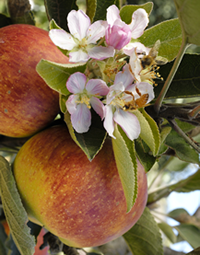Early rising bee catches the best flower and ultimately the best meal
A study has found that bees are better at learning new odours in the morning. This early brain power may have evolved to help the insects sniff out flowering plants and forage for nectar more efficiently.
An experiment in which a team tested more than 1,000 bees is described in the journal Behavioural Ecology and Sociobiology.
Previous research has shown that most flowers accumulate their nectar during the morning, so this would be the period during which learning many new odours would be most useful to the bees. The process of memorising the new odours released by flowers is very energy-intensive for the bees' brains, so being a little "less clever" later in the day could help the insects to conserve that energy. To study the bees' ability to learn, the scientists captured 1,000 forager honeybees (Apis mellifera). They trained groups of the insects at different times of the day to associate a new odour with a food reward.
The team
led by Professor Giovanni Galizia from the University of Konstanz in Germany, could then test each bee to see if it responded correctly to the odour. The "correct" response to a smell was for the bee to extend its proboscis - the long appendage many pollinating insects use to draw nectar from flowers.
Scientists watched each bee's reaction - seeing if it extended it proboscis to feed
When the bees were trained early in the morning, they were much better at remembering which odours meant that they would receive a reward of sugary nectar. Much earlier research had already established that bees' behaviour is very dependent upon the time of day. As far back as 1960, one researcher actually flew a group of bees from Paris to New York and found that the "jet-lagged" bees maintained their Paris-timed daily cycle of activity.
But this, the researchers say, is the first study to show that bees are better able to learn in the morning.
In their journal article, the team wrote that this effect was probably a result of bees and the flowers they pollinate "co-evolving".
"It might be evolutionarily advantageous to be the 'early bee' and to 'catch' the flower in order to out-compete possible competitors such as butterflies, flies and [bees from] other hives," the researchers wrote.
Dr Nigel Raine, a researcher from Royal Holloway, University of London, who specialises in the study of insect behaviour, said that bees were "hugely important to us".
"Not only do bees pollinate many crops we depend upon for food, but they also pollinate wild flowers which helps to maintain the beauty and diversity of the landscape in which we live," he told BBC News.
"These are key reasons why we need to increase our understanding of bee behaviour."

